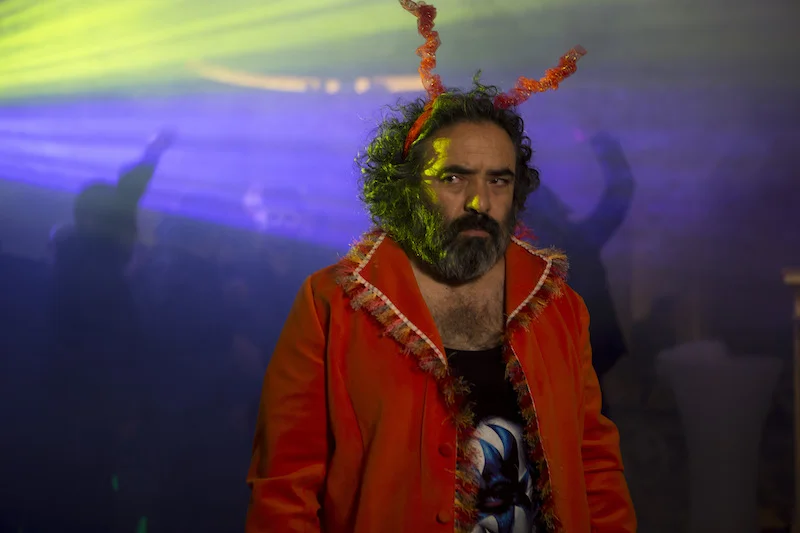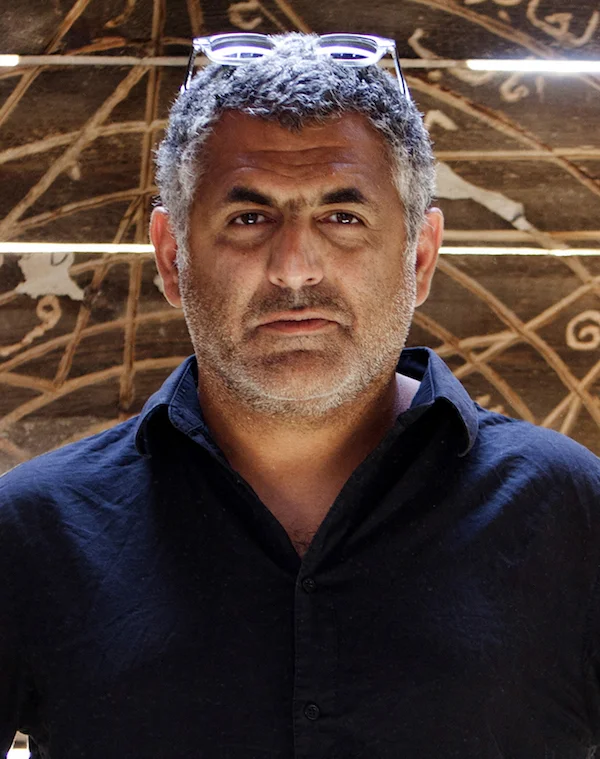It’s interesting that in the same year, two prominent Iranian filmmakers made films where the idea came from the perils of social media. Of course, Jafar Panahi got the inspiration for ‘3 Faces’ from the myriad of fans who send him messages wanting to connect somehow with his talent and rotate in the moons of his celebrity-dom. Mani Haghighi instead with his ‘Pig’ found the humor within the stalking of sorts that happens on the feeds of Twitter and Instagram. And how these days we’ll do just about anything to be famous.
Of course, these two filmmakers are as different as filmmakers can be, yet their latest oeuvres are both featured in the upcoming Iranian Film Festival New York, which will run from January 10th to the 15th at the IFC Center. An event not to be missed.
‘Pig’ is also a film not to be missed. I originally watched it when it world premiered at the 2018 Berlinale and it left me in awe of its maker. It is a wonderful work of art, at once full of funny moments and dark themes, aware of modern day idiosyncrasies yet aware of its heritage and featuring some of the strongest female characters I’ve ever watched on the big screen.
Needless to say, speaking with Haghighi in person was a dream come true. One more of those dreams that the late Richard Lormand, the film’s publicist in Berlin, made possible… Oh, how he’s missed, the man who made the impossible come true.
At the center of the film stands a director, played by Hasan Majuni, clearly Haghighi’s alter ego. He can’t get killed to save his life, and that’s a problem to him. All his esteemed colleagues are getting murdered by a serial killer on the loose. Not being one of his victims makes Hasan doubtful of his importance in the firmament of Iranian filmmakers. It’s a bit like that Woody Allen Marx brothers’ borrowed line, “I don’t want to belong to any club that would have me as a member”… In reverse, of course. Because Hasan wants to belong to this line up, even if it does kill him.
But don’t take my word for how funny and wonderfully dark the film is. Read on to find Haghighi’s wondrous interview, where he talks about everything from why he hates to be put in a box, to social media and why he’s no longer on Facebook. It’s good. And Mani Haghighi’s ‘Pig’ is good — very very good.
Do international audiences have cultural expectations from filmmakers from Iran?
Mani Haghighi: There is very strong cultural expectations of filmmakers from Iran, not to make a film this. I’m beginning to think it’s becoming a bit lazy of us to keep making these social realism family dramas. So maybe it’s time to change gears and do something else. We’ve had a lot of success in that type of cinema so it’s easy to repeat it over and over again. I’d hate to repeat myself in the films that I make. As a person I love repetition. For example if I go to a foreign country, I eat the same food every day.
So like David Lynch who eats the same broccoli every day.
Haghighi: I understand that and I like that. Repetition is really good in life, but really bad in art.
Do you think you have a collage sensitivity? Combining very different plots in one shot for example.
Haghighi: If you’ve seen my film before this one, it’s the same idea. It’s one idea to make a film in a genre, and another idea to make a film between genres, switching genres and the excitement that brings to a film. You think you’re watching, for example in my previous film [‘A Dragon Arrives!’] you think you’re watching a mystery and it turns into a documentary all of a sudden. Here you think you’re watching a ridiculous comedy and it becomes more and more ridiculous, until suddenly. BANG! It’s a tragedy and you don’t know what to do with it. I think that kind of shock is something that really pleases me. One of the things I enjoy doing is — so you thought this was a comedy and here is something different and what are you going to do with that?
Mani Haghighi photographed by Abbas Kosari
It’s funny that you choose to eliminate yourself in the first scene. Why this choice?
Haghighi: The philosophical answer is that’s the death of the author. But I thought if I do that to myself in the beginning, I can do anything I want for the rest of the film. If the biggest joke is on me, and my name is there and my chopped off head is in the gutter, then no one can complain about their names being used. Of course I had permission to use everybody’s name. But I thought it would not be taken as an offensive thing if I did it to myself first.
At the same time you put yourself in the film as the most important director.
Haghighi: Not the most important. I am the fourth one being killed. Fourth is good.
There is also the aspect of social media, that I would like to hear from you about…
Haghighi: Social media is as big and as interesting and as dangerous as it is anywhere else in Iran. For example, what you see in the States right now with cyber lynching and sudden movements of people who rise up against someone and try destroy their character, that happens in Iran all the time. You don’t expect it because you don’t hear about it as much. That was one of the themes I wanted to explore from the very beginning, I wanted to make a film about this. And one of the things I discovered is that it’s kind of hard to do that because how do you show “it”? Film is a visual medium and how do you show the comments and the threads underneath an Instagram post? How do you bring that out visually? So that was an interesting challenge.
You kicks off with that idea, with the four girls on the street and Instagram…
Haghighi: I planted that at the beginning, because I wanted you to know this would be an issue of some kind. And then you almost forget about it for sixty minutes and suddenly it explodes.
How is your own personal relationship with social media?
Haghighi: I’m not in it. I withdrew myself. I was quite active of Facebook four or five years ago and the same kinds of things were beginning to happen. And it also is a waste of time. It really brings the narcissist in you out. This idea of you putting on a post, and then waiting to see what people are going to say about it. It becomes this ridiculous cycle. You say something stupid and they say something stupid and it just goes on and on. One day I realized it’s so easy to deal with it. I’ll just leave it! And life became so normal and interesting. You could read a novel or go for a walk…
Could you talk about developing the female characters, because they are stronger than the male protagonist, especially the mother character?
Haghighi: One of the problems I’ve had with the depiction of Iranian women in Iranian cinema is that they are always presented as passive victims of some problem. And how can that be true in any culture, if you think about it. No matter how bad it is, it can’t be that bad. On the other hand, I’m personally surrounded by all these fantastic strong women who shape my life and shape my experience, both in my family and in my professional life. And I always wondered, where are they? Why aren’t they being represented? So I thought I’ll make a film about this cry-baby man who needs constant support from everyone. And who’s going to give him the support? All these fantastic women who are really strong and well put together and kind of interesting and active choice makers. And at the same time, how they love him. That’s the challenge. How to be strong-minded but also sympathetic and loving and understanding towards my character. That was really hard to plan out.
How is your relationship with your mother?
Haghighi: Oh, that’s a different story. Lets leave my mother out of it.
Do you think you are being limited when people talk about you as an Iranian filmmaker?
Haghighi: Yes I do. I was born in Tehran, I studied in Canada but I live in Tehran now. I don’t understand it. But I think I’ve overcome it. It’s important to be aware that you should overcome that label. Because it is a label. It’s a box they put you in. And it’s easy to understand that box, because Iranian cinema is so specific. At least Iranian cinema represented in festivals outside. Because there are other kinds of Iranian films.
It’s easier for me now because people know me more. But when I was starting… My first film was rejected by every single film festival in the world, except for Tribeca. Finally showed it in Tribeca. Why? Because it was a new festival at that time, it was their second edition I think when they screened that. And they wanted to show new things. But I have letters from film festivals saying “your film is not Iranian”. This is not Iranian cinema. And I would say it’s made in Iran, I’m Iranian and it’s in Farsi… what else do you need? And they would say “Iranian cinema is about children, the village, symbolism, metaphors… blah blah blah. And it has to be poetic.” As if poetry is all about that. I mean you can have other kinds of poetry.
I would argue that ‘Pig’ is a poetic film.

